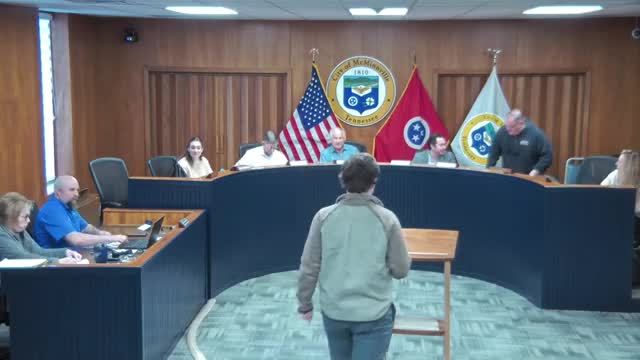Board approves 50-unit Martin Street workforce housing despite neighbor drainage concerns
Get AI-powered insights, summaries, and transcripts
Subscribe
Summary
McMinnville Board of Zoning Appeals approved a special exception for a 50-unit workforce housing project on Martin Street presented by Cooper Companies. Neighbors raised concerns about stormwater, trees and privacy; staff said stormwater and permit reviews remain before construction.
The McMinnville Board of Zoning Appeals approved a special exception for a 50-unit workforce housing development on Martin Street after hearing detailed presentations from the developer and extended public comment about stormwater and privacy concerns.
Joey, a representative of Cooper Companies, told the board the project would provide 50 workforce-rental units and that the developer plans to apply for Tennessee Housing Development Agency (THDA) tax-credit funding. “Workforce housing serves folks, earning 50 to 60% of Warren County the county area median income,” Joey said. He described the intended unit mix and said Cooper Companies typically retains and manages properties long term. He told the board that THDA’s timing and the developer’s schedule would likely place project completion around 2027 if credits are awarded this year.
The project site is roughly 3.5 acres and the proposal calls for two apartment buildings and parking that staff said meets minimum zoning requirements. Staff reported on-site utilities as a 6-inch water line and an 8-inch sewer line and said the proposal meets cited zoning provisions, including sections the presenter read as "14 5 0 7 3 k" and "14 7 0 8.2 d." Cooper Companies said the THDA application is contingent on demonstrating zoning compliance.
Timothy Nicholl, who identified himself as owner and full-time resident at 116 Garfield, urged the board to consider chronic and extreme stormwater problems in the neighborhood, citing heavy rain events in 2022 and recent floods that have affected basements and crawlspaces. “If that's all concrete and building A is built right up against the back of all of those five homes...where is all that water gonna go?” Nicholl asked, adding he wants protections against water reaching his property and asked about the fate of an existing tree line that separates his lots from the project site.
Board and staff members responded that stormwater design, drainage capacity and other technical reviews are addressed through the city’s permitting and plan-review processes rather than the zoning special-exception decision. Staff said the detailed stormwater mitigation and the final civil-engineering plans will be reviewed before permits are issued. A city staff member noted Lyndon (staff) and others will review stormwater submittals as part of permitting.
After discussion, a board member moved to approve the special exception “not to exceed 50 dwelling units, contained within two buildings, as per staff recommendations.” The motion was seconded and the board voted in favor; the chair announced the motion carries.
What happens next: Approval of the special exception clears a zoning hurdle but does not authorize construction. According to the developer’s remarks, Cooper Companies must secure THDA credits (the application cycle was described as having a mid-April deadline), complete entitlement and obtain building permits; staff and specialized reviewers will still evaluate stormwater, lot-line adjustments, final site plans and all other technical elements before permit issuance.
Neighbors asked whether civil-engineering review will be performed by outside civil engineers; staff said the applicant’s civil-engineering plans will be subject to the city’s review during permitting, and the developer said the project intends to use underground stormwater retention (the developer stated they are not a civil engineer and could not provide detailed retention calculations at the hearing).
